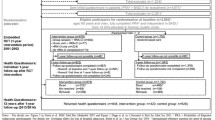Abstract
People live longer today and, therefore, have more opportunity to a quire non-fatal disabilities in old age. Disability in old age has multifactorial causes, including physiological, psychological and social risk factors. An innovative health promotion and prevention programme designed for elderly people was developed at the Albertinen-Haus Geriatrics Centre in Hamburg in 2001 and offered to residents of the city aged 60 years and over who were living in their own homes. Eligible individuals were independent, i.e. without disabilities (not in need of care or support according to the German health system’s categorization), and without cognitive impairment. The programme focuses on areas of health behaviour that are interrelated and target self-efficacy and empowerment. The programme used an interdisciplinary approach in group sessions. The team of health promotion advisers (Gesundheitsberater-Team) consisted of members of four professions, i.e. physician, social worker, physiotherapist, and nutrition and home economics specialist. We decided to work in group sessions because of the potential for positive dynamic effects between group participants and for reasons of cost. We also developed a curriculum to train professional members of interdisciplinary geriatric teams to work as health promotion advisers for elderly people.


Similar content being viewed by others
Notes
“Disability prevention in the older population” (5th Framework European Commission QLK6-CT-1999–02205, Administrative Coordinator: Professor Dr. med. H. P. Meier-Baumgartner, Albertinen-Haus Hamburg; Technical Coordinator: Professor Dr. med. A.E. Stuck, Spital Bern Ziegler, PRO-AGE Study Group).
References
Becker F, Zarif SH (1978) Training older adults as peer counselors. Educ Gerontol Int Q 3:241–250
Bundesministerium für Familie, Senioren, Frauen und Jugend (Hrsg) (2002) Vierter Bericht zur Lage der älteren Generation in der Bundesrepublik Deutschland: Risiken, Lebensqualität und Versorgung Hochaltriger – unter besonderer Berücksichtigung demenzieller Erkrankungen, Bundesanzeiger Verlagsgesellschaft Berlin
Dapp U (2004) Erfolgreiches Altern durch Gesundheitsförderung und Prävention. In: von Renteln-Kruse W (ed) Medizin des Alterns und des alten Menschen. Steinkopff, Darmstadt, pp 23–37
Hellmich A, Teigeler P (eds) (1992) Montessori-Freinet-Waldorfpädagogik, Beltz-Verlag, Weinheim
Labonte R, Penfold S (1981) Canadian perspectives in health promotion: a critique. Health Educ 4:4–9
Lederman S, Farrer M (1986) The Wisdom Project of the American Red Cross in Greater New York: A blueprint for a community-based health care and health education program. In: Dychtwald K (ed) Wellness and health promotion for the elderly. Aspern, Rockville, pp 247–261
Lehr U (2003) Psychologie des Alterns, 10th edn. Quelle & Meyer, Heidelberg
Lewin K (1936) Principles of topological psychology. McGraw-Hill, New York
Mathers CD, Sadana R, Salomon JA, Murray CJL, Lopez AD (2001) Healthy life expectancy in 191 countries, 1999. Lancet 357:1685–1691
Meier-Baumgartner HP, Dapp U (2001) Geriatrisches Netzwerk: Kooperationsmodell zwischen niedergelassenen Ärzten und geriatrischer Klinik mit Koordinierungs- und Beratungsstelle. Schriftenreihe des Bundesministeriums für Familie, Senioren, Frauen und Jugend, vol 204. Kohlhammer, Stuttgart
Meier-Baumgartner HP, Dapp U, Anders J (2004) Aktive Gesundheitsförderung im Alter. Ein neuartiges Präventionsprogramm für Senioren. Kohlhammer, Stuttgart
Nelson EC, Landgraf JM, Hays RD, Wasson JH, Kirk AW (1990) The functional status of patients. Med Care 18:1111–1126
Phelan EA, Anderson LA, LaCroix AZ, Larson EB (2004) Older adults’ view of “successful aging”—how do they compare the researchers’ definitions? J Am Geriatr Soc 52:211–216
von Renteln-Kruse W (2004) Geriatrische Methodik und Versorgungsstrukturen. In: von Renteln-Kruse W (ed) Medizin des Alterns und des alten Menschen. Steinkopff, Darmstadt, pp 38–57
von Renteln-Kruse W, Anders J, Dapp U, Meier-Baumgartner HP (2003) Präventive Hausbesuche durch eine speziell fortgebildete Pflegefachkraft bei 60jährigen und älteren Personen in Hamburg. Z Gerontol Geriat 36:378–391
Robine JM, Romieu I, Michel J-P (2002) Trends in health expectancies. In: Robine JM, et al. (eds) Determining health expectancies. Wiley-VCH, Weinheim, pp 9–12
Sachverständigenrat für die Konzertierte Aktion im Gesundheitswesen (2001) Bedarfsgerechtigkeit und Wirtschaftlichkeit, vol I. Zielbildung, Prävention, Nutzerorientierung und Partizipation. Kurzfassung Gutachten 2000/2001, p 26. (www.svr-gesundheit.de)
Schwartz FW (1999) Strukturelle Einbettung und Qualität von Gesundheitsförderung und Selbsthilfeförderung: GKV-konforme Ansätze und Strategien. In: Ländereinigung für Gesundheit Niedersachsen e.V. (ed): Gesundheitsförderung, Prävention und Selbsthilfe als Zukunftsaufgabe der gesetzlichen Krankenversicherung. Gesundheitspolitische Perspektiven, Hannover, pp 7–14
Schwartz FW, Badura B, Busse R, Leidl R, Raspe H, Siegrist J, Walter U (eds) (2003) Das Public Health Buch. Urban & Fischer, München, Jena
Stuck AE, Siu AL, Wieland GD, Adams J, Rubenstein LZ (1993) Comprehensive geriatric assessment: a meta-analysis of controlled trials. Lancet 342:1032–1006
Stuck AE, Walthert JM, Nikolaus T, Büla CJ, Hohmann C, Beck JC (1998) Risk factors for functional status decline in community-living elderly people: systematic literature review. Soc Sci Med 48:445–469
Stuck AE, Elkuch P, Dapp U, Anders J, Iliffe S, Swift C for the PRO AGE PILOT STUDY GROUP (2002) Feasibility and yield of a self-administered questionnaire for health risk appraisal in older people in three European countries. Age Ageing 31:463–46
Vita AJ, Terry RB, Hubert HB, Fries JF (1998) Aging, health risks, and cumulative disability. N Engl J Med 338:1035–1041
Funding (in alphabetical order): Bundesministerium für Familie, Senioren, Frauen und Jugend, Berlin; Max und Ingeburg Herz-Stiftung, Hamburg
Author information
Authors and Affiliations
Corresponding author
Rights and permissions
About this article
Cite this article
Dapp, U., Anders, J., von Renteln-Kruse, W. et al. Active health promotion in old age: methodology of a preventive intervention programme provided by an interdisciplinary health advisory team for independent older people. J Public Health 13, 122–127 (2005). https://doi.org/10.1007/s10389-004-0097-3
Received:
Accepted:
Published:
Issue Date:
DOI: https://doi.org/10.1007/s10389-004-0097-3




